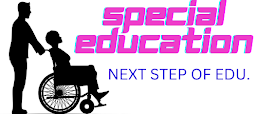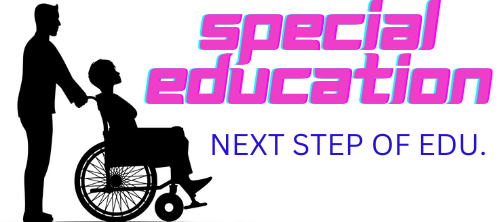ROLE OF SPECIAL EDUCATOR IN SPECIAL EDUCATION FIELD
The role of a special educator is multifaceted and plays a pivotal role in providing inclusive and individualized education to students with disabilities or special needs. These professionals are dedicated to ensuring that every student, regardless of their abilities or challenges, has the opportunity to learn and thrive. In this comprehensive exploration, we will delve into the various aspects of the special educator's role, shedding light on their responsibilities, skills, and impact on students, families, and the education system.
1. Understanding Special Education:
Special education is a specialized branch of education designed to cater to students with disabilities or exceptionalities. The goal is to provide these students with the necessary support, accommodations, and adaptations to access and participate in education on an equal footing with their peers. Special educators are at the forefront of this effort, acting as advocates, teachers, mentors, and facilitators for students with special needs.
2. Roles and Responsibilities of a Special Educator:
1. Assessment and Identification:
Special educators begin their role by identifying students who may require special education services. This involves collaborating with other educators, parents, and specialists to conduct assessments, review student records, and determine eligibility for special education programs.
2. Individualized Education Plans (IEPs):
Special educators are responsible for developing, implementing, and regularly reviewing Individualized Education Plans (IEPs) for each student with a disability. IEPs are customized educational roadmaps that outline goals, objectives, accommodations, and support services tailored to the student's specific needs and abilities.
3. Instructional Planning and Differentiation:
Special educators design and adapt instructional strategies and materials to meet the diverse learning styles and abilities of their students. They utilize evidence-based practices to create engaging and accessible lessons that promote academic growth and skill development.
4. Behavior Management:
Managing and addressing challenging behaviors is a critical aspect of a special educator's role. They develop and implement Behavior Intervention Plans (BIPs) when necessary, providing students with strategies and tools to improve behavior and self-regulation.
5. Collaboration and Teamwork:
Collaboration is key in special education. Special educators work closely with general education teachers, school administrators, support staff, and related service providers (such as speech therapists or occupational therapists) to ensure a cohesive and inclusive educational environment.
6. Advocacy:
Special educators act as advocates for their students and their families, ensuring that they receive the necessary services, accommodations, and resources. They are knowledgeable about special education laws and regulations, advocating for students' rights and inclusive education.
7. Assistive Technology:
Special educators often integrate assistive technology into their teaching to support students' learning and communication. This includes devices, software, and tools that help students with disabilities access the curriculum and participate in classroom activities.
8. Emotional and Social Support:
Beyond academics, special educators provide emotional and social support to their students. They create a safe and nurturing classroom environment, fostering students' self-esteem and social interactions with peers.
9. Data Collection and Progress Monitoring:
Special educators maintain thorough records of student progress, interventions, and assessments. They use data to evaluate the effectiveness of their teaching strategies and to make informed decisions about modifying instruction.
10. Professional Development:
Keeping up-to-date with the latest research, teaching methodologies, and best practices in special education is crucial. Special educators engage in continuous professional development to enhance their skills and knowledge.
11. Transition Planning:
Special educators assist students with disabilities in transitioning from one grade level to another or preparing for post-secondary education, employment, or independent living. This includes developing transition plans and connecting students with community resources and services.
12. Parent and Family Engagement:
Special educators maintain open and collaborative communication with parents and guardians. They involve families in the educational process, providing updates, insights, and opportunities for parent participation in decision-making.
13. Inclusive Practices:
Promoting inclusion is a fundamental aspect of the special educator's role. They work to ensure that students with disabilities are integrated into general education settings to the maximum extent possible, fostering a sense of belonging among all students.
3. Skills and Qualities of a Special Educator:
To excel in their roles, special educators need a diverse set of skills and qualities, including:
1. Empathy: Special educators must understand and empathize with their students' unique challenges and needs.
2. Patience: Teaching students with disabilities can be challenging, requiring patience and persistence.
3. Flexibility: Special educators must adapt their teaching methods and strategies to meet the changing needs of their students.
4. Strong Communication: Effective communication with students, parents, colleagues, and specialists is essential.
5. Organization: Managing IEPs, data, and various responsibilities requires strong organizational skills.
6. Advocacy Skills: Advocating for students' rights and needs within the education system is a critical skill.
7. Collaboration: Working as part of a team with other educators and specialists is essential for success.
8. Knowledge of Special Education Laws: A deep understanding of special education laws and regulations is crucial to ensure compliance and protect students' rights.
9. Teaching Expertise: Special educators should be knowledgeable about evidence-based teaching practices for students with disabilities.
4. Impact of Special Educators:
The role of special educators has a profound impact on students, families, and the education system as a whole:
1. Student Achievement: Special educators play a pivotal role in helping students with disabilities reach their full potential academically and socially.
2. Inclusivity: They promote a culture of inclusivity, breaking down barriers and fostering a sense of belonging for all students.
3. Family Support: Special educators provide valuable support and resources to families, helping them navigate the complexities of the special education system.
4. Professional Development: Through their continuous professional development, they contribute to the ongoing improvement of special education practices.
5. Advocacy: Special educators advocate for the rights of students with disabilities, influencing policy changes and improved access to educational resources.
6. Innovation: They drive the development and implementation of innovative teaching methods and technologies to support students with disabilities.
In conclusion, the role of a special educator is multifaceted and crucial in ensuring that students with disabilities have equal access to quality education and the opportunity to thrive. Through their expertise, advocacy, and dedication, special educators empower students to overcome challenges, reach their full potential, and become active participants in society. Their work has a lasting and positive impact on individuals, families, and the broader education community.



0 Comments
Have you any doubt, Tell me ;